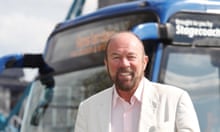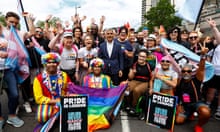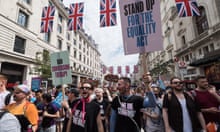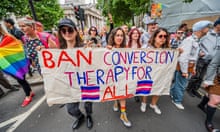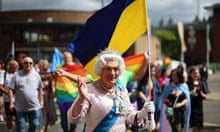Nearly seven in 10 lesbian, gay, bisexual and trans (LGBT) people have been sexually harassed at work, according to research for the Trades Union Congress revealing a “hidden epidemic”.
The survey, published on the International Day Against Homophobia, Transphobia and Biphobia on Friday, found that more than two in five LGBT people (42%) said they had experienced colleagues making unwelcome comments or asking unwelcome questions about their sex life. More than a quarter (27%) reported receiving unwelcome verbal sexual advances.
Two-thirds (66%) said they did not tell their employer about the harassment, and a quarter of these said it was because they were afraid of being “outed” at work.
The survey found LGBT women were more likely to experience unwanted touching and sexual assault at work. More than a third (35%) reported experiencing unwanted touching, for example hands placed on their lower back or knee.
More than one-fifth (21%) reported experiencing sexual assault, for example unwanted touching of the breasts, buttocks or genitals, or attempts to kiss them, while one in eight (12%) LGBT women said they had been seriously sexually assaulted or raped at work.
Black and minority ethnic (BME) women and disabled men and women reported even higher rates of harassment and sexual assault. More than half (54%) of LGBT BME women said they had experienced unwanted touching at work, 45% reported sexual assault and 27% reported serious sexual assault or rape.
Half of LGBT disabled women reported unwanted touching, 38% reported sexual assault and almost a quarter (24%) reported serious sexual assault or rape. Disabled men reported significantly higher levels of sexual harassment and assault than non-disabled men, with more than one in four (28%) reporting sexual assault.
The TUC’s general secretary, Frances O‘Grady, said: “This research reveals a hidden epidemic. In 2019 LGBT people should be safe and supported at work, but instead they’re experiencing shockingly high levels of sexual harassment and assault.
“Workplace culture needs to change. No one should think that a colleague being LGBT is an invitation for sexualised comments or inappropriate questions, let alone serious acts of assault.”
A spokesperson for the Government Equalities Office said: “It is appalling LGBT people are suffering this harassment. Workplaces should be safe, supportive environments for everybody. The government will consult shortly on how we can strengthen and clarify existing laws on third-party harassment, as well as making sure employers fully understand their legal responsibility to protect their staff.”
The TUC called on the government to introduce a statutory code of practice on sexual harassment and harassment at work. “Government must change the law to put the responsibility for preventing harassment on employers, not victims. And anyone worried about sexual harassment at work should join a union,” O’Grady said.
The survey was conducted by the market research agency ICM Unlimited, which interviewed an initial sample of 1,001 LGBT workers in November last year.
Before the TUC survey, the most recent research into LGBT people’s experiences of workplace sexual harassment was conducted by the Government Equalities Office. This found that 1% of LGBT people had experienced sexual harassment or violence at work, but this finding was based on a single question within a wider survey, which the TUC said “did not attempt to define sexual harassment or contextualise it”.
About one in six (16%) of those surveyed by the TUC said the sexual harassment at work affected their mental health, and a similar proportion (16%) said they had left a job as a result of being sexually harassed.
‘I just want to come into work and do my job’
Helen, 31, a psychologist from Manchester, told the TUC about a number of incidents of sexual harassment from colleagues. She described being at the work gym and overhearing two male colleagues talking about her.
“One said: ‘She’s such a waste of a woman,’ referring to the fact I am in a committed relationship with a woman,” she said. “I thought: just because I chose not to have sex with you, a man, I am a waste of a woman? It made me feel really uncomfortable so I finished my workout halfway through.
“When I was leaving the gym one of the men asked me: ‘Is it because you’ve never had a real man?’ He laughed and then they both wolf-whistled at me. I haven’t been back to the work gym since.”
Helen, who did not want to give her real name, said: “If I had a penny for every time someone asked me if I was a lesbian because I ‘had not had a real man’ then I would be so rich I’d never have to work again.”
She added: “I just want to come into work and do my job. I feel angry in the moment the harassment is happening, but then I try to forget it. It happens so often, I’d be reporting someone so regularly I don’t know how my employers would deal with it. And I suppose I’ve learned to accept this behaviour as part of our culture and our society, because it doesn’t just happen at work.”

